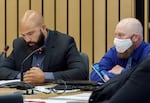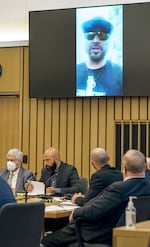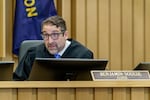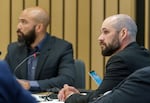
Joey Gibson, left, and Russell Schultz, III, during trial on Monday, July 18, 2022, in Multnomah County Circuit Court. A Multnomah County judge acquitted both on Tuesday, July 19.
Kristyna Wentz-Graff / OPB
Multnomah County Circuit Court Judge Benjamin Souede granted a motion Tuesday to acquit far-right activists Joey Gibson and Russell Schultz, who each faced one riot charge, saying no reasonable jury could find that their behavior at a 2019 street confrontation “threatened an imminent breach of the peace.”
“Oregon’s law clearly does not permit such an outcome,” Souede said, issuing a harsh rebuke to the district attorney’s office for pursuing a jury trial on the evidence presented. “I do not find this to be a close question. I am somewhat bewildered that the state has driven this case to this point.”
Schultz, Gibson and their associate Mackenzie Lewis each faced a charge of riot for their roles in political violence in May 2019 at the now-closed Northeast Portland bar Cider Riot. Lewis’ attorney also sought a motion for acquittal, but Souede denied that effort. He was convicted on the charge Wednesday.
After the prosecution rested, defense attorney Brian Schmonsees said that the state had presented no evidence that Schultz had participated in any violent activity. On the contrary, Schmonsees argued, all the video evidence showed Schultz standing on the periphery as far-right activists and anti-fascists exchanged fist jabs and threw projectiles outside Cider Riot that day, and at one point video showed him telling other people in his group that it was time to leave.
“There simply is no time when Mr. Schultz engages in actual physical activity,” Schmonsees said.
Souede agreed.
“The state appears to be trying to convict Mr. Schultz for being present at an incident where violence occurred and it may not do so,” he said. “It’s the job of this court to prevent this kind of overreach.”

Video evidence of Joey Gibson plays above him, second from left, during the first day of trial, Monday, July 18, 2022, in Multnomah County Circuit Court. Gibson, Russell Schultz, III, and MacKenzie Lewis faced charges for allegedly instigating a street fight between Patriot Prayer and anti-fascists on May 1, 2019, at the now-closed bar Cider Riot.
Kristyna Wentz-Graff / OPB
In videos presented by the prosecution, Gibson is seen taunting anti-fascists on the bar patio and telling them to “do something.” After someone in the crowd spits on Gibson, he is seen wiping the spit off on one of the Cider Riot patrons.
“The record is overwhelming, and I suggest indisputable, that Mr. Gibson spoke obnoxiously to the crowd that was gathered at Cider Riot,” Souede said in his ruling. “He was provocative, he was taunting, he was acting like a troll.”
In handing down his ruling, the judge rebuked Gibson and Schultz, saying they decided the best use of their time was to go bother a group of people who were minding their own business. Souede said a reasonable juror could easily conclude there is ample evidence Gibson and Schultz intentionally provoked the group at Cider Riot and sought to make them angry, playing “an adult version of ‘I’m not touching you,’” he said.
“There is ample evidence from which a reasonable juror could conclude that the violence that erupted that day wasn’t an accident,” Souede said. “It was part of a plan, as Mr. Gibson is heard saying on the video.”
He compared their behavior to bringing a lit match right up to gasoline and then walking away from the chaos with their hands in their pockets.
A charge of offensive touching or harassment may have stuck, Souede said.
“These defendants are not charged with inciting anything or with encouraging anything or with provoking anything,” he said during his 20-minute ruling. “The grand jury issued indictments solely for the charge of riot.”
All of the evidence, however, had nothing to do with the charges, Souede said.

Judge Benjamin Souede gives the jury instructions on the opening day of trial, Monday, July 18, 2022, in Multnomah County Circuit Court. Russell Schultz, III, MacKenzie Lewis, and Joey Gibson faced charges for allegedly instigating a street fight between Patriot Prayer and anti-fascists on May 1, 2019, at the now-closed bar Cider Riot.
Kristyna Wentz-Graff / OPB
Souede said the men’s conduct at Cider Riot, while perhaps disagreeable, amounted to speech, and Oregon law prohibits taking speech into consideration when deciding riot charges.
“If this defendant could be convicted in this case, there would be no protection for protesters in Oregon on other occasions,” Souede said, before referencing massive racial justice protests that happened in Portland in 2020. “There would be no protection for protesters who decide the next time a federal police force is deployed in Portland. There would be no protection for the next Wall of Moms. If being there and using your body to take up space during a protest is sufficient, then any protester runs the risk, if it turns out tumult ensues, of being convicted of riot.”
After the trial, Multnomah County District Attorney Mike Schmidt sounded displeased that Gibson and Schultz did not make it to the jury.
“The difference between the facts and evidence in the charges against Schultz and Gibson and the charges against Lewis are negligible,” Multnomah County District Attorney Mike Schmidt said after the trial concluded Wednesday. “While we respect the court’s decision regarding Mr. Gibson and Mr. Schultz, we disagree with the legal analysis used to reach it and stand by the charges the grand jury indicted based on the facts and evidence in this case.”
The acquittal underscores a broader problem the criminal justice system faces in trying to address a common far-right brand of provocation, intentionally meant to nudge the boundary of what is legal without crossing over.
“We frequently see groups like Patriot Prayer and other bigoted and anti-democracy groups pushing legal boundaries because their goals are to accelerate political violence and conflict without facing accountability,” said Lindsay Schubiner, who runs Western States Center’s program countering white nationalism, adding that Gibson and similar groups have created the conditions for political violence to occur.
And while it’s troubling Gibson and others have avoided legal consequences, this isn’t a problem that the criminal justice system alone should be tasked with addressing, Schubiner said.
“That makes it even more important that other community and government institutions respond to the threat posed by bigoted and anti-democracy groups,” she said. “We can’t let them normalize political violence.”
As an example of tools other than criminal prosecution, Schubiner suggested the civil lawsuit brought against the organizers of the Unite the Right rally in Charlottesville. A jury in that lawsuit found the organizers guilty of conspiracy and awarded the plaintiffs $25 million.

Joey Gibson, left, and MacKenzie Lewis during trial on Monday, July 18, 2022, in Multnomah County Circuit Court. Lewis, Joey Gibson, and Russell Schultz III, faced charges for allegedly instigating a street fight between Patriot Prayer and anti-fascists on May 1, 2019, at the now-closed bar Cider Riot.
Kristyna Wentz-Graff / OPB
In his denial of Lewis’ motion for acquittal, Souede pointed to video of Lewis shoving a person and throwing an empty can of mace at a crowd of people as reason for the trial to continue.
Lewis’ trial continued Tuesday afternoon with his attorney Kelly Doyle briefly calling Gibson to the stand before resting his case. Closing remarks concluded Wednesday morning with Doyle telling the jury his client’s helmet and gloves were not necessarily worn to fight, but may have been for a more benign purpose such as protection from the sun or to ride a motorcycle.
The jury began deliberating at 10:30 a.m. Wednesday. After being briefly stuck in the late afternoon, one vote shy of a unanimous guilty verdict, by 5 p.m. the last juror had changed their vote and convicted Lewis of riot.
Sentencing is scheduled for Aug. 1.
